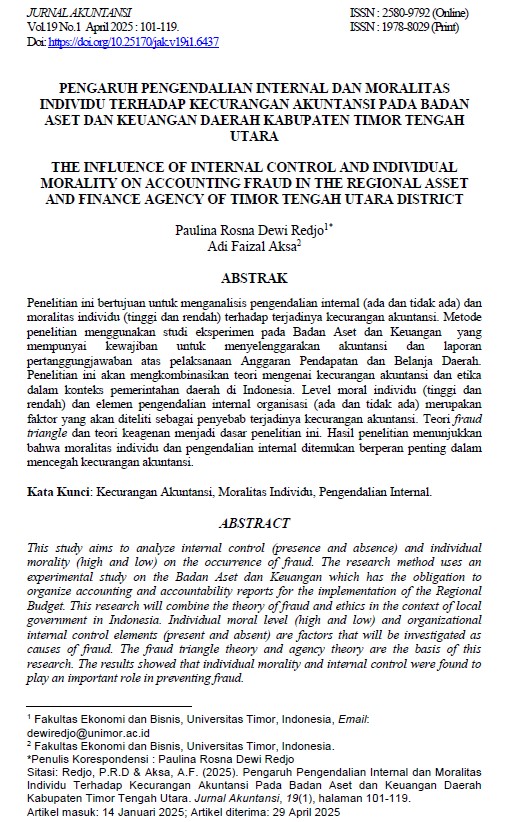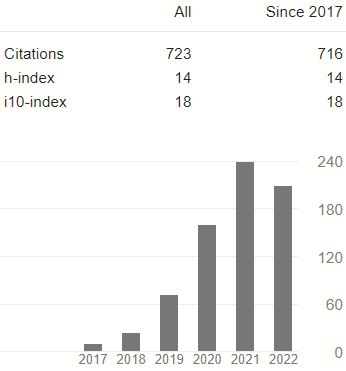THE INFLUENCE OF INTERNAL CONTROL AND INDIVIDUAL MORALITY ON ACCOUNTING FRAUD IN THE REGIONAL ASSET AND FINANCE AGENCY OF TIMOR TENGAH UTARA DISTRICT
DOI:
https://doi.org/10.25170/jak.v19i1.6437Keywords:
Accounting Fraud , Internal Control, Individual MoralityAbstract
This study aims to analyze internal control (presence and absence) and individual morality (high and low) on the occurrence of fraud. The research method uses an experimental study on the Badan Aset dan Keuangan which has the obligation to organize accounting and accountability reports for the implementation of the Regional Budget. This research will combine the theory of fraud and ethics in the context of local government in Indonesia. Individual moral level (high and low) and organizational internal control elements (present and absent) are factors that will be investigated as causes of fraud. The fraud triangle theory and agency theory are the basis of this research. The results showed that individual morality and internal control were found to play an important role in preventing fraud.
References
Abdullahi, R., & Mansor, N. (2018). Fraud prevention initiatives in the Nigerian public sector: Understanding the relationship of fraud incidences and the elements of fraud triangle theory. Journal of Financial Crime, 25(2). 527-544. https://doi.org/10.1108/JFC-02-2015-0008.
Albrecht, W. S., Albrecht, C. C., Albrecht, C. O., & Zimbelman, M. F. (2019). Fraud Examination (6th ed.). Boston: Cengage Learning.
Aksa, A. F., Irianto, B. S. & Bawono, I. R. (2020). The urgency of rationalization for unethical behavior and accounting fraud. J. Akunt. Multiparadigma 11, 653–664
Albrecht, W. S. (2019). Fraud Examination (6th ed.). Boston: Cengage Learning.
ACFE Indonesia. (2020). Survei fraud Indonesia 2019. In Survey Fraud Indonesia (pp. 1–76).
Anggara, I. Y., & Suprasto, H. B. (2020). Pengaruh integritas dan moralitas individu pada kecurangan akuntansi dengan sistem pengendalian internal sebagai variabel mediasi. E-Jurnal Akuntansi, 30(9). 2296-2310. https://doi.org/10.24843/EJA.2020.v30.i09.p10.
Antarwiyati, P., & Purnomo, R. E. (2017). Motivasi melakukan fraud dan faktor-faktor yang mempengaruhinya. Jurnal Akuntansi & Auditing Indonesia, 21(2),157-166. https://doi.org/10.20885/jaai.vol21.iss2.art7.
Aziz, M. A. bin A., Alam, S., Said, J., & Alam, M. M. (2015). Assessment of the practices of internal control system in the public sectors of Malaysia. Asia-Pacific Management Accounting Journal, 10(1), 43-62.
Coram, P., Ferguson, C., & Moroney, R. (2008). Internal audit, alternative internal audit structures and the level of misappropriation of assets fraud. Accounting & Finance, 48(4), 543-559. DOI: 10.1111/j.1467-629X.2007.00247.x
Cressey, D. R. (1953). Other people’s money: A Study in the social psychology of embezzlement. Free Press.
Dewi, G. R. (2016). Pengaruh moralitas individu dan pengendalian internal pada kecurangan akuntansi (Studi eksperimen pada pemerintah Daerah Provinsi Bali). Jurnal Ilmiah Akuntansi, 1(1), 77-92. https://doi.org/10.23887/jia.v1i1.9984.
Eisenhardt, K. M. (1989). Agency theory: An assessment and review. Academy of Management Review, 14(1), 57-74.
Ghozali, I. (2018). Aplikasi analisis multivariate dengan program IBM SPSSS 25 Edisi 9. Badan Penerbit Universitas Diponegoro.
Hernandez, J. R., & Groot, T. L. C. M. (2007). Corporate fraud: Preventive controls which lower fraud risk. ARCA, Amsterdam Research Center in Accounting.
Ikatan Akuntan Indonesia. (2001). Standar Pemeriksaan Akuntan Publik SA. seksi 316- Pertimbangan atas Kecurangan dalam Audit Laporan Keuangan.
Jensen, Michael C. & Meckling, W. H. (1976). Theory of the firm: Managerial behavior, agency costs and ownership structure. Journal of Financial Economics. 3(4), 305-360. https://doi.org/10.1016/0304-405X(76)90026-X.
Kesumawati, L. E., & Pramuki, N. M. W. A. (2021). Pengaruh Pengendalian Internal dan Moralitas Individu Terhadap Kecurangan (Fraud): Studi Eksperimen Pada Koperasi Se-Desa Batubulan. Hita Akuntansi Dan Keuangan, 2(2), 524-543. https://doi.org/10.32795/hak.v2i2.1570.
Komala, R., Piturungsih, E., & Firmansyah, M. (2019). Pengaruh Asimetri Informasi, Moralitas Individu Dan Pengendalian Internal Terhadap Kecenderungan Kecurangan Akuntansi. E-Jurnal Akuntansi, 29(2), 645 – 657. doi:10.24843/EJA.2019.v29.i02.p12.
Lestari, N., & Supadmi, N. (2017). Pengaruh Pengendalian Internal, Integritas dan Asimetri Informasi Pada Kecurangan Akuntansi. E-Jurnal Akuntansi, 21(1), 389-417. Retrieved from https://ojs.unud.ac.id/index.php/akuntansi/article/view/33166
Redjo, P.D.R., & Sudibyo, Y.A. (2017). Pengaruh pengendalian internal dan moralitas. Purwokerto: Prosiding Seminar Nasional LPPM Unsoed.
Rest, J. R., Narvaez, D., Thoma, S. J., & Bebeau, M. J. (2020). Postconventional moral thinking: a Neo-kohlbergian approach. Psychology Press.
Scott, W. R. (2005). Financial accounting theory (4th ed.). Pearson Education Canada.
Sugiyono. (2020). Metode penelitian kuantitatif, kualitatif dan R & D. Alfabeta.
Zarlis, D. (2018). Pengaruh Pengendalian Internal Terhadap Pencegahan Fraud di Rumah Sakit (Studi empiris pada Rumah Sakit swasta di Jabodetabek). Transparansi: Jurnal Ilmiah Ilmu Administrasi, 1(2), 206-217. https://doi.org/10.31334/trans.v1i2.304.

Downloads
Published
Issue
Section
License
Copyright (c) 2025 Paulina Risma Dewi Redjo Redjo, Adi Faizal Aksa

This work is licensed under a Creative Commons Attribution-ShareAlike 4.0 International License.
Authors who publish with this journal agree to the following terms:
- Authors retain copyright and grant the journal right of first publication with the work simultaneously licensed under a Creative Commons Attribution-ShareAlike 4.0 International License that allows others to share the work with an acknowledgment of the work's authorship and initial publication in this journal.
- Authors are able to enter into separate, additional contractual arrangements for the non-exclusive distribution of the journal's published version of the work (e.g., post it to an institutional repository or publish it in a book), with an acknowledgment of its initial publication in this journal.
- Authors are permitted and encouraged to post their work online (e.g., in institutional repositories or on their website) prior to and during the submission process, as it can lead to productive exchanges, as well as earlier and greater citation of published work.














